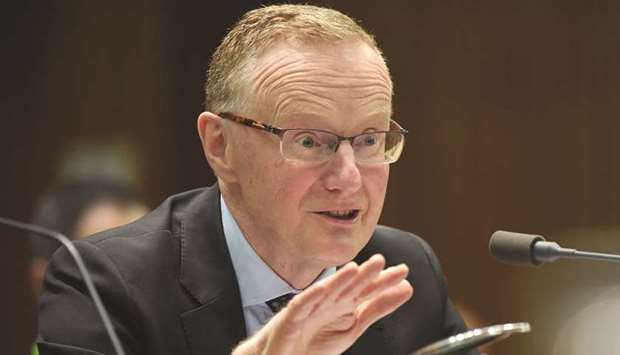“It is likely to be some time before we are at full employment and the inflation rate is comfortably within the target range on a sustained basis,” Lowe said in his opening statement to a parliamentary panel in Canberra on Friday. “We are prepared to maintain the current monetary policy stance until these benchmarks are more clearly in sight.”
In his semi-annual testimony, the governor also noted the currency’s resilience in recent years. He said policy makers had hoped that as the Federal Reserve tightened, it would drive the US dollar higher and its Aussie counterpart lower. That, in turn, would spur local inflation and jobs and let the Reserve Bank of Australia start to normalise rates.
“That process has taken a lot of time to occur, it may be that it’s now occurring, although the Australian dollar has not moved that much,” the governor said. “I still think a lower dollar would be helpful.”
The Aussie has dropped 8% against the greenback in the past six months.
Lowe signalled Australia’s economy will need to generate higher household incomes and faster inflation before policy is tightened for the first time since 2010.
He also highlighted global risks to the trade-reliant nation, including mounting protectionism in the US and the Trump administration’s decision to inject stimulus into an economy already running at full capacity.
“Financial markets remain relaxed about the implications of this for inflation. I am less relaxed,” he said of the US tax cuts. “One can’t rule out the possibility that the Federal Reserve will have to withdraw monetary accommodation more quickly than currently projected, with possibly disruptive consequences in financial markets.”
The RBA is relying on a tightening labour market - the jobless rate is 0.3 percentage point off estimated full employment of 5% - to drive wage growth and rekindle inflation. Lowe wants to see consumer-price growth back around the midpoint of its 2% to 3% target.
Data last week showed slightly faster wage growth and the lowest unemployment rate in almost six years.
“Taken together, these data are consistent with our view that wages growth and inflation will pick up gradually over the next couple of years,” Lowe said. “The number of job vacancies, as a share of the labor force, is at a record high. Firms are reporting that it is harder to find workers with the necessary skills, and survey-based measures of hiring intentions remain positive.”
RBA liaison with companies indicates “larger wage increases for certain occupations where workers with the necessary skills are in short supply. We expect that we will hear more such reports over time,” he said. Still, traders see little chance of a rate hike in the next 12 months.
Lowe described the cooling of house prices in Sydney and Melbourne as a welcome development. The gains of recent years “were not sustainable and were posing a medium-term risk to our economy,” he said. The governor added that a strong jobs market, low rates and above-average economic growth was fortunate timing amid a housing slowdown.
“All these things are helping with the adjustment,” he said. “We are nevertheless continuing to keep a close eye on housing market developments across the country.”
Elsewhere, Lowe said he was “appalled” at the scandals that had emerged from a wide-ranging public inquiry into Australia’s finance industry.
“The whole process is really showing the benefit of sunlight,” he said. “Sunlight is acting as a very good disinfectant here.” He said the inquiry has exposed “deficiencies” in the three core foundations of finance: trust; delivering service; and good risk management. Lowe said the result had been a tightening in lending standards, but voiced fears there might be overreaction because of the terrible nature of some of the findings that could start to restrict the availability of credit.
The governor also turned his attention to drought conditions that have spread to New South Wales after the state had its driest July since 2002. The impact on Australia’s economy would be significant if the drought becomes as bad as the conditions experienced at the turn of the century, he said.
The House Economics Committee that questioned Lowe was shorthanded today with only six of 10 members attending the hearings. That, together with the steady nature of policy and the Australian economy story, led to proceedings wrapping up 40 minutes short of the allotted three hours.

